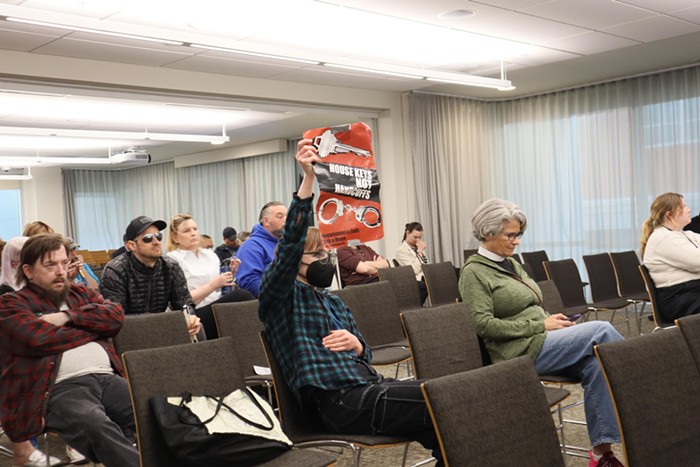
Yet there was Commissioner Steve Novick yesterday, on the verge of making Portland the first city in the country to slap a tax penalty on egregious CEO pay, and declining to revel in it.
"I'm going to say only 'aye,'" Novick told his colleagues as his time to vote for the policy came shortly before 4 pm. "I'm desperate to get this passed in the next seven minutes. We will make East Coast media deadlines."
It was, apparently, a canny move. Novick's victory lap is playing out in the national press.
The commissioner has a triumphant portrait in the New York Times, anchoring a story about his CEO pay surtax. New York magazine and Fortune have since piled on.
This is exactly the type of thing Novick was hoping for.
The new surtax, aimed at the growing problem of wealth inequality, will affect companies that pay their CEOs salaries that are far out of step with employee pay. Firms that pay CEOs 100 times or more the rate of the average worker will receive a 10 percent "surtax" on the Business License Tax they pay to do business in Portland. Companies that pay CEOs 250 times or more the average worker pay will see a 25 percent surtax.
An analysis circulated by Novick's office suggests the tax could raise between $2.5 million and $3.5 million a year.
But it does nothing to hamper wealth inequality if other cities around the country don't follow suit, sending a message to large corporations to pay employees more (or executives less). That's why Novick was so tickled last month to see the Wall Street Journal inveigh against his measure: Even in dismissing the idea as foolhardy, the paper was spreading the idea around.
The Guardian chimed in with a story earlier this week, and with the policy's passage Wednesday, outlets around the country are doing the same thing.
Novick's proposal is enabled by new US Securities and Exchange Commission rules that, beginning next year, will require public companies to report the ratio their CEOs are paid compared to average employees. It was opposed by the Portland Business Alliance, which argued it would only hamper business activity in Portland, while failing to meaningfully solve inequality.
Commissioner Dan Saltzman, the lone "nay" in a 3-1 vote, had another reason for opposing the plan. He thinks it's a bit careless.
"I really believe the headroom under the [business license tax] should be reserved for truly unforeseen situations, which are…never too far around the corner," Saltzman said. "I don't believe this is the right time, right place, or right reason to increase business income tax." According to the Oregonian, Commissioner Nick Fish would have joined Saltzman in opposition, were he present.
But Mayor Charlie Hales and Commissioner Amanda Fritz agreed with Novick's idea—cribbed from proposals in other parts of the country, but a first for any city.
By the way, these kinds of CEO pay ratios aren't at all uncommon. As we've reported, City Revenue Director Thomas Lannom testified that his office has looked at local pay ratios that are above 1,000-to-one. The Oregon AFL-CIO says Oregon CEOs are paid an average of 327 times the salary of average employees.


















